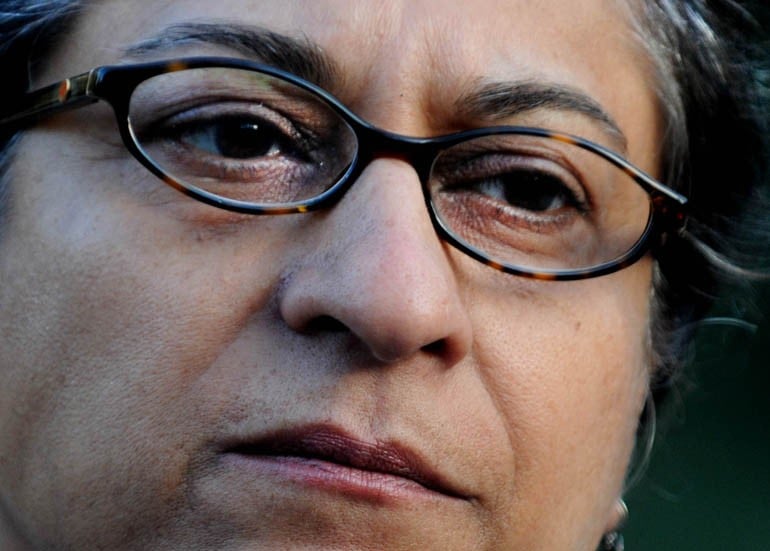
And how to retrieve it after Asma

‘Asma Jahangir’s demise has left a big vacuum which will never be filled’. This is a statement that has found recurring enunciation in the social as well as print and electronic media.
Kamal Munir’s articulation with reference to her death carries in it a good measure of elegance. He writes, "It was impressive how in spite of all the hostility she faced, and the battles she fought, she maintained her sense of humour, regaling us with stories of all kinds of characters in her life. Tiny in size herself, the void she has left is huge." That statement can be contextualised in her Cambridge sojourn that she undertook some two months ago where she was invited for a guest lecture at the Centre of South Asian Studies. His last sentence in particular exudes stylistic beauty.
The point worth our reflection is somewhat different and a bit profounder in essence. It remains a fact that the void Asma Jahangir has left will never be filled. The irony is that when any icon epitomising liberal values and ethos departs for final abode, it is very rare that somebody steps in to carry on their legacy. I find the assertion of Zahid Hussain far-fetched that "in her death the country may have lost its bravest soul and a fearless street fighter, but her legacy lives on".
It is far too early to ascertain how long will her legacy remain.
It may sustain itself as veterans of the stature of I.A. Rehman, Hussain Naqi and Asma’s own sister Hina Jilani are very much around. However, who will succeed them? That is the nagging apprehension of all those who care for human rights in Pakistan as Asma Jahangir’s most significant legacy.
One must bear in mind that human rights can only be ensured in a liberal space. If liberals are being squeezed out of the socio-political equation, the issues pertaining to human rights would erode into insignificance. I am taking such a position with unequivocal certitude because of a question that might trouble readers. Before answering that question, it is pertinent to analyse to how the anti-liberal faction(s) or, in simpler terms, the religious right has sustained itself.
Quite unlike the state the liberals find themselves in, when a person of some prominence representing the religious right dies, the vacuity thereby created is filled instantaneously. Thus, there is no dearth of the ulema-i-din in Pakistan, no matter what sectarian denomination we are dealing with. Their procreation at a phenomenally large scale is an irrefutable fact. The mushroom growth of seminaries spawning from one end of the country to another demonstrates the empowerment of the religio-political groups.
The position of the religious right has markedly strengthened over the last few decades at the expense of liberals, for whom the space is fast shrinking. Given the resources, religious zeal, a semblance of popular appeal and patronage by some components of the state that the cadres of multiple Islamic denominations are imbued with, even the state itself with all the might at its command has been rendered helpless in establishing its writ.
With the religious right growing from strength to strength, the liberals are bound to retrocede. The religious right, beset with sectarian divisions, nevertheless has been known to smooth the divisions and provide a united front when it needs to. The anti-Ahmadiyya movements of 1953 and 1974, and the Tehreek-i-Nizam-i-Mustafa against Z.A Bhutto in 1977 are examples of such unification.
Equally important is the fact that the religious right adheres to a particular creed. It may have differences but within that creed, divergent religious groups have unanimity over certain postulates like Khatam-i-Nubuwwat.
All said and done the religious right, despite all its vulnerabilities and fissures, has a strong impulse of well-knit collectivity when it feels threatened.
Quite conversely, liberalism by its very definition is antithetical to any singular ideology that may act as a glue for many individuals to come together as a collectivity. Liberalism usually strives for what Karl Popper calls Open Society in which multiple subjectivities operate and co-exist. Therefore, it is not surprising that during the entire span of Pakistan’s 70 years of history, the liberals have never managed to organise themselves. The state has also never allowed liberalism to figure in its narrative. Therefore, it has existed on the margins or in isolated pockets.
It undoubtedly is to Asma’s credit that she kept the torch of liberalism alight in the face of myriad difficulties. Even ruthless dictators and retrogressive elements could not deter her. In doing this, she was exceptional.
In a previous column, I have argued that the vast majority of Pakistanis are indifferent to what sort of legacy they would care to leave behind. The set of values they would bequeath to the coming generations has been the least of their concern. Therefore, the future of the society and the character-building of posterity hardly matters to people in this country. The plausibility of the disquiet that I harbour is particularly well-founded in the case of the liberals, a species which has not consolidated and developed in Pakistan.
I strongly believe that liberal space can be retrieved only by adopting a future-oriented approach. Passing on liberal values to the next generation is extremely crucial because it is vital for the survival of Pakistan. Liberalism can also be revitalised by the production of knowledge.The handful of liberals must train to join the academia because that is the most effective way to influence the youth by producing a counter-narrative. It may be argued that the universities, in their current state, will not be welcoming to such liberal academics, but I believe that in small pockets, such liberal academic values and training can be protected and fostered.
That is what Pakistan needs the most and that is how Asma Jahangir’s legacy can be perpetuated.